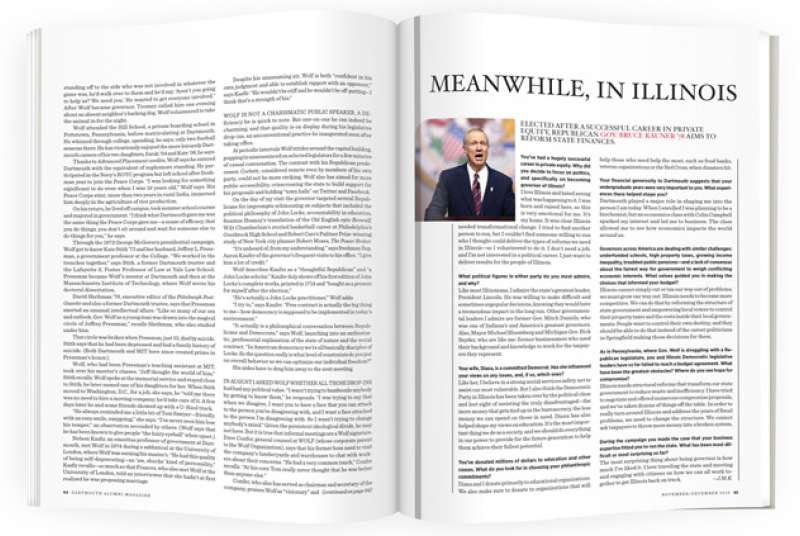
Meanwhile, In Illinois
You’ve had a hugely successful career in private equity. Why did you decide to focus on politics, and specifically on becoming governor of Illinois? I love Illinois and hated seeing what was happening to it. I was born and raised here, so this is very emotional for me. It’s my home. It was clear Illinois needed transformational change. I tried to find another person to run, but I couldn’t find someone willing to run who I thought could deliver the types of reforms we need in Illinois—so I volunteered to do it. I don’t need a job, and I’m not interested in a political career. I just want to deliver results for the people of Illinois.
What political figures in either party do you most admire, and why? Like most Illinoisans, I admire the state’s greatest leader, President Lincoln. He was willing to make difficult and sometimes unpopular decisions, knowing they would have a tremendous impact in the long run. Other governmental leaders I admire are former Gov. Mitch Daniels, who was one of Indiana’s and America’s greatest governors. Also, Mayor Michael Bloomberg and Michigan Gov. Rick Snyder, who are like me: former businessmen who used their background and knowledge to work for the taxpayers they represent.
Your wife, Diana, is a committed Democrat. Has she influenced your views on any issues, and, if so, which ones? Like her, I believe in a strong social services safety net to assist our most vulnerable. But I also think the Democratic Party in Illinois has been taken over by the political class and lost sight of assisting the truly disadvantaged—the more money that gets tied up in the bureaucracy, the less money we can spend on those in need. Diana has also helped shape my views on education. It’s the most important thing we do as a society, and we should do everything in our power to provide for the future generation to help them achieve their fullest potential.
You’ve donated millions of dollars to education and other causes. What do you look for in choosing your philanthropic commitments? Diana and I donate primarily to educational organizations. We also make sure to donate to organizations that will help those who need help the most, such as food banks, veteran organizations or the Red Cross, when disasters hit.
Your financial generosity to Dartmouth suggests that your undergraduate years were very important to you. What experiences there helped shape you? Dartmouth played a major role in shaping me into the person I am today. When I enrolled I was planning to be a biochemist, but an economics class with Colin Campbell sparked my interest and led me to business. The class allowed me to see how economics impacts the world around us.
Governors across America are dealing with similar challenges: underfunded schools, high property taxes, growing income inequality, troubled public pensions—and a lack of consensus about the fairest way for government to weigh conflicting economic interests. What values guided you in making the choices that informed your budget? Illinois cannot simply cut or tax our way out of problems; we must grow our way out. Illinois needs to become more competitive. We can do that by reforming the structure of state government and empowering local voters to control their property taxes and the costs inside their local governments. People want to control their own destiny, and they should be able to do that instead of the career politicians in Springfield making those decisions for them.
As in Pennsylvania, where Gov. Wolf is struggling with a Republican legislature, you and Illinois Democratic legislative leaders have so far failed to reach a budget agreement. What have been the greatest obstacles? Where do you see hope for compromise? Illinois needs structural reforms that transform our state government to reduce waste and inefficiency. I have tried to negotiate and offered numerous compromise proposals, and we’ve taken dozens of things off the table. In order to really turn around Illinois and address the years of fiscal problems, we need to change the structure. We cannot ask taxpayers to throw more money into a broken system.
During the campaign you made the case that your business expertise fitted you to run the state. What has been most difficult or most surprising so far? The most surprising thing about being governor is how much I’ve liked it. I love traveling the state and meeting and engaging with citizens on how we can all work together to get Illinois back on track.
Julia M. Klein, a contributing editor at Columbia Journalism Review, was formerly a political reporter for The Philadelphia Inquirer. Her work has appeared in The Wall Street Journal, The New York Times, The Washington Post and Mother Jones.










